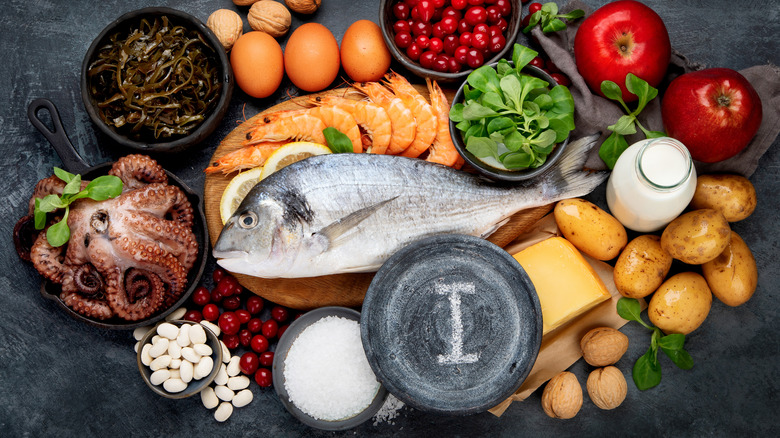You're Not Getting Enough Iodine If This Happens To You
How often do you eat oysters, seaweed, eggs, or Greek yogurt? These foods are rich in iodine, a mineral that supports thyroid function and immune health. Low iodine levels can affect thyroid hormone production, leading to goiter, cognitive deficits, or hypothyroidism, warns the National Institutes of Health (NIH). Researchers also say that more than 683 million people worldwide don't get enough of this nutrient in their diet. Pregnant women, vegans, and individuals who eat few or no dairy foods, eggs, and fish may be at risk for iodine deficiency.
The human body cannot produce this nutrient on its own, explains Harvard T.H. Chan School of Public Health. Therefore, it's essential to consume iodine-rich foods, such as sea vegetables, beef liver, poultry, and iodized salt. Dietary supplements may be necessary, too. Your thyroid gland needs iodine to produce thyroxine and triiodothyronine, two hormones that regulate metabolism and other biological processes. The recommended daily intake is 150 micrograms per day for adults and children over 14 years old. If you're pregnant, aim for about 220 micrograms per day, recommends the NIH.
Iodine deficiency is relatively rare in the U.S. because most Americans get this nutrient from iodized salt. Note that Himalayan salt, sea salt, and other specialty salts don't contain iodine, says the NIH. Let's see what happens when you're iodine deficient, and how to recognize the signs.
A diet low in iodine can affect your thyroid
Iodine occurs mostly in animal products. Therefore, vegans and individuals with lactose intolerance may have a hard time getting this nutrient from food. The same goes for those living in regions with iodine-deficient soils, points out the NIH. As the researchers note, low-iodine diets can affect thyroid function, increasing the risk of goiter and hypothyroidism.
Goiter, or thyroid enlargement, may cause fatigue, muscle weakness, memory problems, dry skin, drowsiness, constipation, and diminished mental focus, explains the Mayo Clinic. Some people also experience difficulty breathing and swallowing. Hypothyroidism has similar symptoms, including constipation, fatigue, and increased sensitivity to cold, notes the American Thyroid Association. If left unaddressed, this condition can lead to impaired mental function and affect your ability to work, says the NIH.
Chronic iodine deficiency may contribute to follicular thyroid cancer, a disorder that accounts for 15-20% of all thyroid cancers (per Verywell Health). Its symptoms appear in the later stages of the disease and include a lump in the neck, breathing problems, couching, hoarseness, and voice changes. On the positive side, most patients have an excellent prognosis, with five-year survival rates ranging between 64-100%, reports the American Cancer Society.
Iodine deficiency may also cause pregnancy complications
As discussed earlier, pregnant women are more likely to become deficient in iodine. If that happens, they may experience stillbirth or deliver their babies prematurely. There is also a risk of miscarriage, warns the American Thyroid Association. Iodine deficiency during pregnancy can affect your child, too. This condition may cause hearing and speech problems, cognitive deficits, and cretinism. On top of that, it can affect your child's growth and development.
The best thing you can do is to prevent these problems in the first place. For starters, include more milk, yogurt, cheese, seafood, cod, eggs, and iodized salt in your diet. Dried seaweed (nori) is another option that provides 155% of the recommended daily iodine intake per serving (per the NIH). A 3-ounce serving of baked cod supplies 106% of the recommended daily iodine intake. Another option is to swap regular bread for whole-wheat bread containing iodate dough conditioners.
Pregnant women and other groups at risk for iodine deficiency can also take dietary supplements formulated with potassium or sodium iodide, suggests the NIH. Over 96% of supplemental potassium iodide is absorbed into the body. Prenatal supplements may contain iodine, too.
The experts at Harvard T.H. Chan School of Public Health say that high iodine intakes are likely safe for healthy individuals. However, some people are sensitive to this compound and may develop hyperthyroidism due to excess iodine. To stay on the safe side, consult a doctor before making any major changes to your diet.



